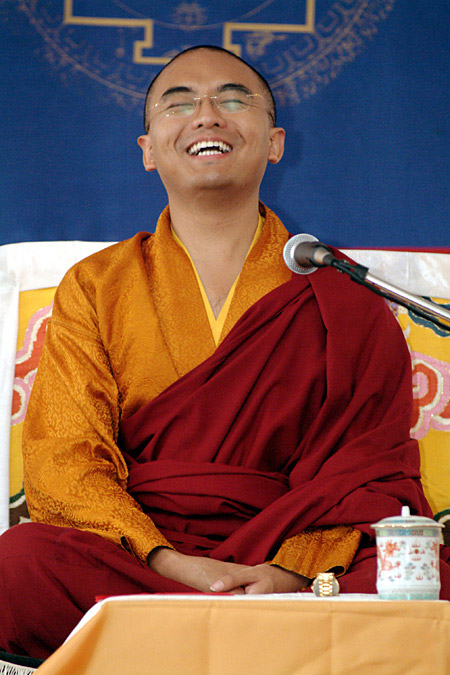My experience of meditation lately feels like this:
1. Stabilize on breath. Having been doing lots of work on concentration lately, I feel like I’m getting to the point where instead of trying to pin down my attention on the breath, it’s more like I spend a little bit of time trying to find what door to open. Once I open the door, I’m with the breath.
2. Stay with breath. Have sensation that fluid is leaking from my brain.
3. Start drooling.
4. Notice the fluid in my ears draining.
5. Nose runs, Eyes tear.
6. Feel intense pleasure. In the. You know. Pleasure-y kind of way.
7. Stay with breath. Watch as pleasure morphs into intense nausea. Watch as nausea launches attack on the nerve endings of my stomach. Watch either as nausea naturally morphs or I swallow it back.
8. Continue watching breath feeling a full body awareness that manifests in a distinct awareness of the edges of my skin.
9. Culminate meditation session, feeling kind of awesome, other-worldly and spent.
My experience of my worldly life lately feels like this:
Bad.
It’s interesting. As my mediation sessions feel more and more accessibly good, dramatic, shifting, etc., I find my behavior in the world fairly sticky. I’m less mindful, more compulsive, more awkward and irritable. I’m fairly undisciplined. My concentration seems less accessible when it comes to any task that involves symbols like words or numbers. I told someone I hated them. (How old am I?) I’ve been getting carried away in conversations. I’m spacey and distracted and speedy. So speedy. Like the blades of a whirring fan, these are the thoughts in my mind.
At the start of Hardcore Dharma, three weeks ago, I had this insight that really hit hard at the time: essentially that my meditation practice had nothing to do with my life. I mean I know meditation definitely has to with general life, overall and in the long run. But I think in the past I thought of meditation as kind of a cash transaction: in the morning I sit for thirty minutes, thus paying for a day in which I am a wonderful listener and supremely present and say brilliant things that make the world wake up with an appreciative chuckle. When I failed at discipline it was because my practice was maybe off – and when I skipped a session I essentially handed myself a “get out of responsibility for your actions free card” for the day.
Then I read in Daniel Ingram’s book in which he states that morality is a very important (he says it is the first and last) yet *different* training than concentration and insight.
I got jazzed. Of course. Take responsibility for yourself while you are interacting in the world of content. Hold yourself to standards. Be kind and sensitive and realize your happiness is not necessarily of paramount importance to others. Realize that while meditation may provide some mental space, it is essentially your will and discipline, not sitting, that is going to finish your spreadsheet, cook your rice, be nice to your mother, etc. etc. Meditation is about ultimate reality – morality is about relative reality.
Sidebar/anecdote: two weeks ago in HCD we were talking about why we know mindfulness is the best yet it is so hard to do. One of the best things we talked about in our little breakout group was essentially about how mindfulness can be so gut-wrenchingly awkward. You realize you’re not listening to your friend, you resolve to be mindful. You breathe and stare at them like a crazy zombie until they ask you why you are looking at them like that. You pull back, you push forward, pull back, push forward, hoping to find that easeful zone. I find when my boyfriend asks me a question about Buddhism, 75% of my answers include metaphors about levels, see saws and those dipping bird sculptures found on the desks of executives.
Point being, while I think it is important to not see meditation as payment for good behavior, I think I realized that I’ve gone off the deep end. While insights about no-self, impermanence and emptiness are about ultimate reality, they also do a really good job of helping with relative reality. While I’m psyched about the possibility of attaining the Jhana states, I also have to remember to reconnect with the day to day mental management that meditation provides. Meditation can tangibly help with morality, by slowing us down and revealing space. When Ethan offered us the list of three goals – the first goal relating to stress-relief and dealing with issues, the second relating to finding personal awakening, and the third being finding awakening in order to help all over beings, of course I’m gonna be all “Third goal or bust!”. But the truth is I know I’ve got so much confusion that my confusion’s got confusion. And while it feels completely amazing to absorb in ultimate reality concentration or sensate vibration vipasana, I also need to be humble. Instead of looking to my practice to completely destabilize me, I need to see its gentle side. I can allow my meditation to help me in the world. I need to summon the fortifying aspects of meditation, the acceptance, the deep seeing, the unpacking of tricky emotions.
In Mastering the Core Teachings of the Buddha, Daniel Ingram discusses some negative emotions that can come up during later Jhana states. (Jhanas are the stages of meditative absorption that the Buddha supposedly went through, layed out like a map.) As I was reading along I was relating to almost every emotion – ranging from irritability to a desire for substances to overwhelming, nothing-really-matters depression. Ooh – maybe I’ve experienced an advanced Jhana state! I thought to myself, and looked out the window, pleased.
Then I sighed.
Or it could be I grew up in suburban New Jersey.
That’s probably more like it.

